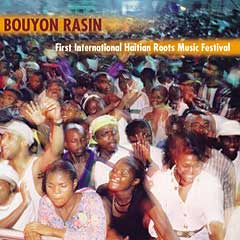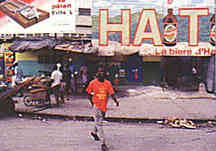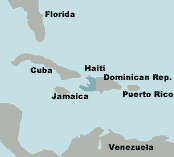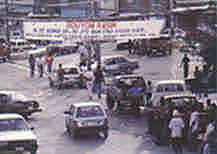BOUYON RASIN
First Haitian Roots Music Festival Live
| CD 68.988 |
 The western part of the Caribbean island Hispaniola is called Haiti. It turns its face towards Jamaica and Cuba and is in fact in many ways similar to these countries and yet so different. Haiti is a burned-out republic in many ways. All over the country you can smell charcoal fires, and because most tropical woods have been cut down, one has to wonder where this charcoal comes from. Just across the border in the Dominican Republic one sees Jumbo-Jets landing with hundreds of tourists on all-inclusive packages. But only a few adventurous travellers come to Haiti and maybe they will stay in the historic Hotel Oloffson. The famous Hotel Oloffson is the scenery of Graham Greenes novel "The Comedians" which describes the life in Haiti under President Duvalier's regime.. The owner of the hotel is Richard Morse, whose mother, Emérante de Pradines is a famous Haitian folksinger. Morse had opened the hotel in the '80s for concerts of young bands like Boukman Eksperyans and under his direction the group RAM rehearsed there during the military coercion. Past and present, politics and culture are closely linked in Haiti.
The western part of the Caribbean island Hispaniola is called Haiti. It turns its face towards Jamaica and Cuba and is in fact in many ways similar to these countries and yet so different. Haiti is a burned-out republic in many ways. All over the country you can smell charcoal fires, and because most tropical woods have been cut down, one has to wonder where this charcoal comes from. Just across the border in the Dominican Republic one sees Jumbo-Jets landing with hundreds of tourists on all-inclusive packages. But only a few adventurous travellers come to Haiti and maybe they will stay in the historic Hotel Oloffson. The famous Hotel Oloffson is the scenery of Graham Greenes novel "The Comedians" which describes the life in Haiti under President Duvalier's regime.. The owner of the hotel is Richard Morse, whose mother, Emérante de Pradines is a famous Haitian folksinger. Morse had opened the hotel in the '80s for concerts of young bands like Boukman Eksperyans and under his direction the group RAM rehearsed there during the military coercion. Past and present, politics and culture are closely linked in Haiti.Years ago Haiti was a centre of a rich heritage of Caribbean music, which influenced Cuba, Jamaica and New Orleans with its cultural creations born out of the mix of African ritual music and European traditions.
The modern urban pop music of Haiti dates back to the period between 1955-58, when bandleaders Jean-Baptiste Nemours and Weber Sicot gave birth to Compás (or Konpa) and Cadence Rampa. A rhythm similar to merengue, konpa had become quite stagnant for a decade or so and was not promising much in the way of creativity or change Its counterpart, Mzik Rasin, has been growing mor popular since the middle of the eighties while drawing on Haitian roots for ist inspiration.. Rasin Music or "MIzik Rasin" is music of political and social commitment. As a member of the first Rasin music group Boukman Eksperyans said:
"Rasin is the next reggae. There is spirituality and there is politics. We're talking about a revolution."

 The language spoken in Haiti is Haitian Creole, enshrined in the 1987 constitution as an official language alongside French. Most of the Haitian artists sing in Creole. Haitian Kreyól is a blend of African languages with French, which developed since 1697, when the island Hispaniola was divided into French and Spanish parts
The language spoken in Haiti is Haitian Creole, enshrined in the 1987 constitution as an official language alongside French. Most of the Haitian artists sing in Creole. Haitian Kreyól is a blend of African languages with French, which developed since 1697, when the island Hispaniola was divided into French and Spanish parts bandmembers are working in the USA with other groups.
bandmembers are working in the USA with other groups. Vodou is up to these days something full of secrets, even more complex than Afrobrasilian Candomblé or Cuban Santeria. Vodou is very present in Rasin rhythms like Ibo, Congo, Yanvalou, Mayi, Petro or Djoumba. It is a focus of life for many Haitians, for whom this music is made for and for whom the festival "Bouyon Rasin" was organised.
Vodou is up to these days something full of secrets, even more complex than Afrobrasilian Candomblé or Cuban Santeria. Vodou is very present in Rasin rhythms like Ibo, Congo, Yanvalou, Mayi, Petro or Djoumba. It is a focus of life for many Haitians, for whom this music is made for and for whom the festival "Bouyon Rasin" was organised.